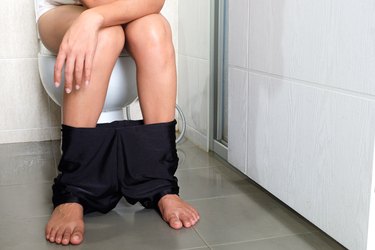
The American Gastroenterological Association (AGA) explains that irritable bowel syndrome (IBS) is a gut health issue that can cause pain, cramping, bloating, diarrhea and constipation. Most people can control their symptoms with a fiber-rich diet, stress reduction and sometimes medicines.
"There is no best diet for everyone with IBS, "says Kelly Issokson, RD, CNSC, registered dietitian at the Cedars-Sinai Nutrition and Integrative Inflammatory Bowel Disease Program in Los Angeles. "Some diet changes help all types of IBS, and some are better for constipation type, called IBS-C. Diet care needs to be individualized to fit the person," she says.
Video of the Day
Video of the Day
Foods to Combat IBS Constipation
According to the National Institute of Diabetes and Digestive and Kidney Diseases (NIDDK), your doctor may recommend more fiber or a low-FODMAP diet for IBS. FODMAP foods are a group of sugars that are found in certain grains, vegetables, fruits and dairy products.
NIDDK advises that soluble fiber is best for IBS constipation or diarrhea. "Soluble fiber can help motility, and is found in foods like beans, fruits, oats, carrots and legumes," Issokson says. "You may need to limit insoluble fibers if you find that these trigger IBS symptoms. These include whole grains, broccoli, cabbage and fruits with skin, like apples."
The AGA adds that many people will benefit from avoiding dairy products and high-fat foods, but some will not, so it recommends keeping a food journal before making any diet changes to find out what foods trigger your symptoms.
"Common triggers for IBS-C include artificial sweeteners, lactose in fresh dairy products and the sugar fructose, which may be found in products containing high-fructose syrup, fruit juices, sodas and baked goods," Issokson says.
Other Tips for IBS Constipation
The American Society for Gastrointestinal Endoscopy (ASGE) describes IBS-C as pain, bloating and bowel changes that include straining, infrequent bowel movements, hard lumpy stools and a feeling of not completely emptying after a bowel movement. In addition to boosting soluble fiber intake, the ASGE recommends cutting back on caffeine and soda.
"Along with diet recommendations for IBS, if you have constipation, you should try to eat at regular meal intervals, don't skip meals and make sure you chew your food slowly and completely," Issokson says. "These basic eating behaviors are very important."
Issokson also suggests adding two kiwi fruit per day to your diet, which may reduce constipation. "Psyllium husk fiber supplement may also be helpful," she says.
More About FODMAP
The NIDDK and other sources note that doctors may recommend a low-FODMAP diet for IBS. This diet reduces sugars that are hard to digest and that cause bloating and gas. Higher FODMAP foods you might scale back on or avoid on a low-FODMAP diet include many fruits, vegetables, dairy products, wheat, honey, high-fructose foods, candy and gum with artificial sweeteners.
But Issokson says a low-FODMAP diet may work better for IBS diarrhea and could worsen constipation. "A low-FODMAP diet is not a first-line therapy for IBS and is not appropriate for everyone," she says.
"In general, if diet and lifestyle modifications are not helping, talk to your doctor about seeing a dietitian. Don't try this diet on your own. A dietitian that specializes in gastrointestinal disorders can help you understand the best personalized approach to help you effectively manage your symptoms."
Other Strategies for Managing IBS
Lifestyle changes like increasing physical activity, reducing stress and getting enough sleep are also important, the NIDDK points out. "Exercise is especially important for IBS-C because it helps your colon become more mobile and relaxed," Issokson says.
Diet changes for IBS can be confusing and complicated. If you try to manage on your own, you may develop food anxieties, and searching for what foods to eat can affect your quality of life. Issokson recommends searching for a dietitian who specializes in gastrointestinal health through the International Foundation for Gastrointestinal Disorders or Academy of Nutrition and Dietetics.
Read more: Your Ultimate Guide to Living Well With IBS
- American Gastroenterological Association: “Irritable Bowel Syndrome (IBS)”
- Kelly Issokson, MS, RD, CNSC, Nutrition and Integrative Inflammatory Bowel Disease Program, Cedars-Sinai, Los Angeles
- National Institute of Diabetes and Digestive and Kidney Diseases: “Definition & Facts for Irritable Bowel Syndrome”
- American Society for Gastrointestinal Endoscopy: “Understanding Irritable Bowel Syndrome with Constipation (IBS-C)”